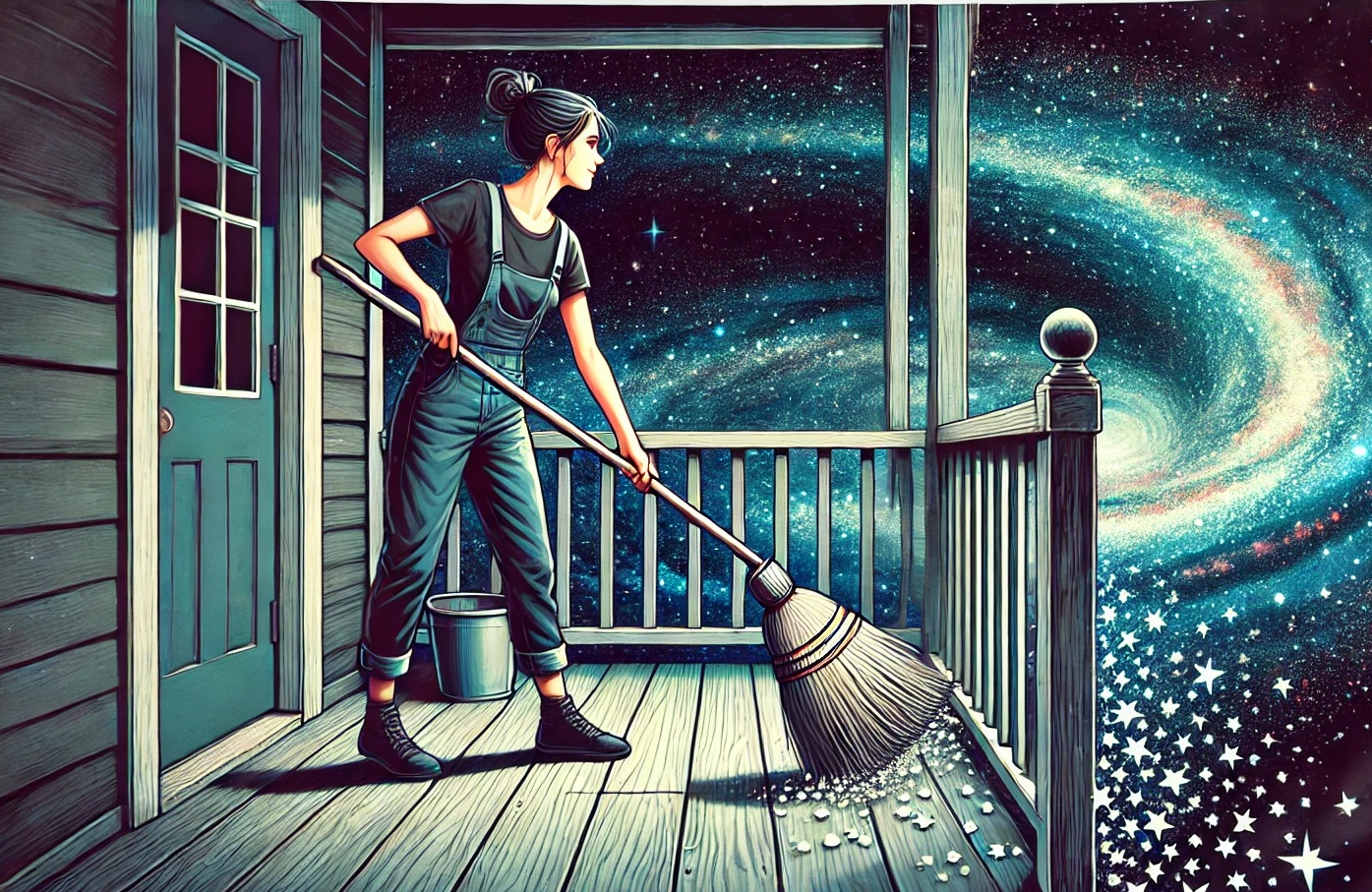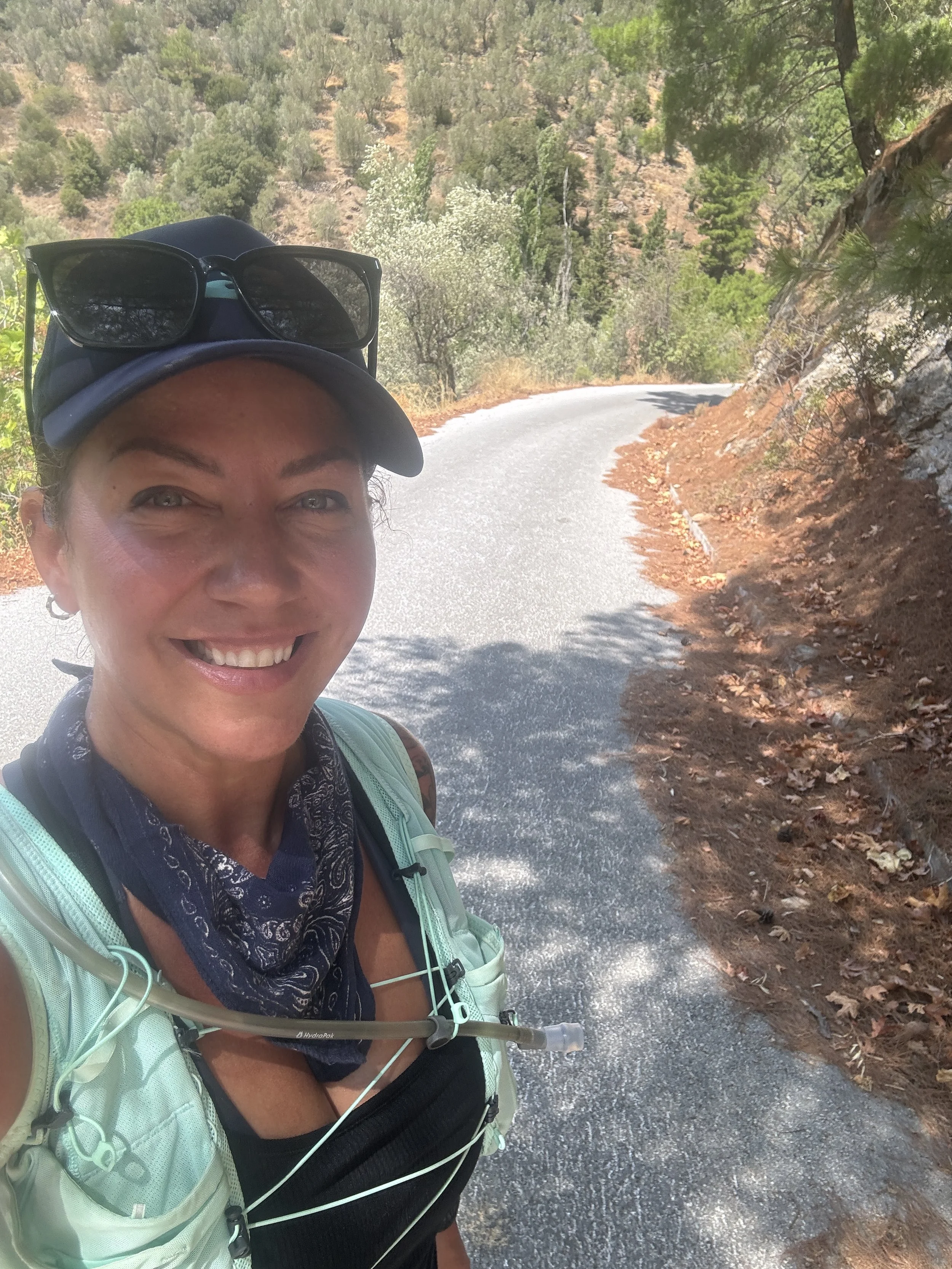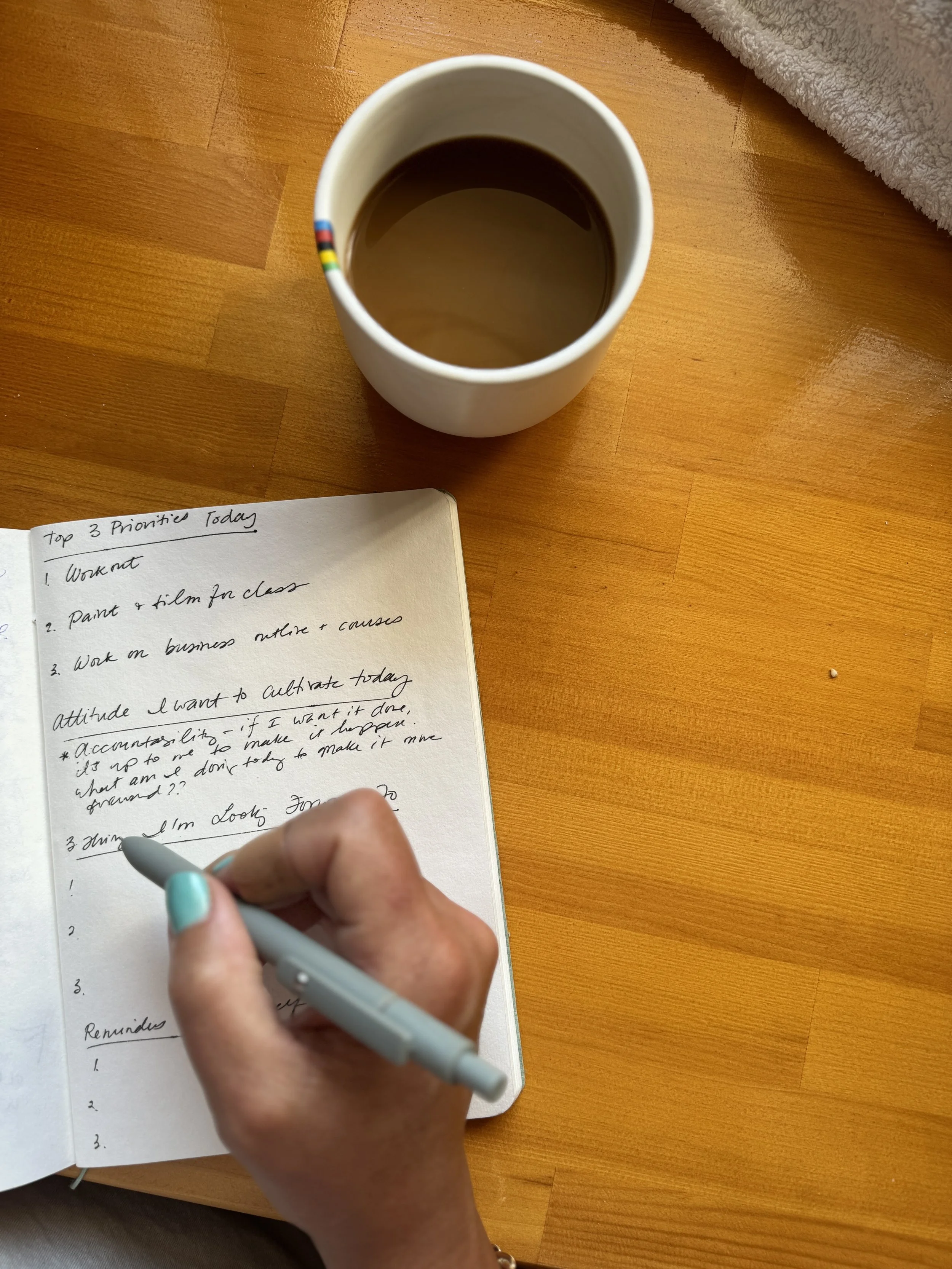My Mind Palace: Inner Peace
How to Craft a Mental Hygiene Routine With Mindful Consumption
The happiness of your life depends upon the quality of your thoughts - Marcus Aurelius
The Mind Palace
My happiness is not accidental and it’s not effortless. While you can almost always find me smiling, a lot of folks don’t realize I actively cultivate this mindset for myself every single day. Think of your mind like a house: just as you would carefully design and furnish a beautiful, functional space, you must do the same for your thoughts. You have to clear out the clutter, organize your mental rooms, and fill them with ideas, feelings, and intentions that support your well-being. Beautiful things—thoughts, creativity, and peace—thrive in an environment that’s well-tended and intentional. You can't build a palace on shaky ground, filled with debris and chaos. Yet, we often neglect to care for our mental space and then wonder why we feel overwhelmed, as if we’re prisoners of our own minds rather than architects of them.
Every day, I have a choice—and each day is made up of hundreds, if not thousands, of micro-choices. I can wake up annoyed, or I can wake up in awe of the sunrise. I can dread writing a letter to the IRS, or I can be pleased that I have the documents ready to send. I can wish the coffee would make itself, or I can grind the beans and appreciate the time I’ve carved out for myself. I can open my phone the moment I wake up and bombard my tender mind with the steaming pile of hate and violence that is the news—or I can wait until I’ve had my coffee, skim the headlines, and put the phone down, knowing that doom-scrolling won’t solve any problems or help me be a better person. I can share positive things with friends, or I can repost horror stories. I can listen to people argue on TV, or I can listen to a podcast on reframing my mindset.
I make myself a happy person. I tend to my garden. Every. Single. Day. All. Day. Long.
The only things I truly own are my time and my peace. And my time is a finite resource, running out at an unknown rate. I don’t have time to kill, spare, or waste. I guard my time and my peace with the same fierceness a mama bear uses to guard her cubs. This is my sanctity, my sanity, my health, and my well-being—and it’s not up for grabs. The time and energy you spend on anything takes away from what you have left for everything else. If you’re caught up in drama, watching TV, following sports, stewing over your boss, arguing with your partner, or stuck in self-loathing, you lose the capacity to focus on what really matters. You lose time for finding solutions, getting in shape, pursuing a new career, starting a business, or falling in love.
The average American spends about three hours per day watching TV. That’s 21 hours a week—practically a part-time job. And that doesn’t even include time spent on social media, podcasts, or radio! People often say, "I don't have time." But the truth is, time isn’t the problem—it’s how we choose to spend it. If you’re consuming material that doesn’t serve who you want to be or where you want to go, you’ll end up in the same place. More often than not, that place is overwhelmed, anxious, angry, helpless, and defeated.
You are the average of the five people you spend the most time with. - Jim Rohn
Don't Let What You Consume, Consume You
Growing up, my mom always said, “Who you hang out with determines a lot about who you become.” And let me tell you, I made some questionable choices! Many of us have heard something similar from our parents, but this wisdom applies to more than just our friends and family—it extends to everything we let into our lives. From the TV shows we binge to the news we watch, the books we read, and the social media we scroll through, all of these shape who we are and how we feel.
Today, we’re drowning in passive consumption, and it’s a big deal. Let’s start with TV, movies, and the news. Many people love drama—whether it's reality TV, sitcoms, or workplace comedies. Think about The Office, Love Island, Keeping up With the Kardashians or The Real Housewives. These shows take the everyday struggles we all experience and amplify them for entertainment. But in doing so, they also keep us hooked on the very drama we might be trying to escape from in our own lives.
Then there are movies and books that dive into heavy, often dark themes—stories filled with violence, vengeance, and despair. The more we consume this kind of content, the more desensitized we become. Our sense of what’s normal begins to warp, and we start to view these exaggerated, sometimes toxic scenarios as not only acceptable but entertaining.
Think about it: if your idea of unwinding is watching people get blown to pieces on a big screen, maybe it’s time to reconsider. If your way of relaxing with your partner is watching another couple scream at each other on TV, that might be worth reflecting on. And if you gather with friends to watch shows where people pretend to be friends while backstabbing each other, that might merit reflection.
A man is but the product of his thoughts. What he thinks, he becomes. - Mahatma Gandhi
The News: Fueling Fear and Division
Oh, the news—I’m sure you remember, just like I do, when we thought the news was actually about reporting facts. Many people still believe they need to watch the news to stay informed, but what kind of information are we really getting? In America, news has become increasingly biased and sensationalized. With the rise of platforms like Reddit and YouTube, we now see a flood of “news”-type shows that look and sound official, but aren’t produced under any journalistic or ethical standards. What used to be a respected profession can now be done by anyone with a smartphone and a podcast setup—whether it’s two kids from the neighborhood or an extremist at work adding special effects to their rants.
It’s becoming harder to tell what’s credible and what’s not, or even why something is being considered newsworthy. Sitting in front of the TV for hours doesn’t mean you’re staying informed. If you need to know about major events, skim the headlines or seek out reliable, unbiased sources. But spending an hour watching a politician you disagree with will only raise your blood pressure and deepen divisions. It’s not teaching you anything new; it’s just fueling your anger, frustration, or helplessness.
Even more concerning is how much of today’s news seems designed to make you angry at others. It feels like modern media often aims to keep people riled up and divided, because a divided audience is easier to manipulate—and more likely to stay tuned in. Nothing keeps you glued to the screen quite like a good dose of outrage, followed, of course, by an ad break.
What You See is What You Get
The truth is, what you surround yourself with becomes a part of who you are. If you spend your days immersed in negativity—whether it’s through the people you associate with or the media you consume—you’ll inevitably start to see the world through a negative lens. It’s like wearing tinted glasses: if you're constantly exposed to fear, hatred, and division, that’s what will color your view of the world. Soon, it won’t just be the news that feels chaotic or upsetting, but everything around you.
But here's the good news: when you start becoming mindful of what drives your emotions and actions, you’re no longer at the mercy of external forces. You're no longer being pulled in every direction by whatever you consume. Instead, you gain control. When you stop getting wound up by anxiety-inducing news, disturbing movies, or toxic (real or fictional) people, you reclaim your power. You have a say in how you feel, how you react, and what you choose to focus on.
This isn’t about burying your head in the sand or pretending the world doesn’t have problems. It’s about protecting your mental space—your mind palace. Just like a well-kept home, your mind needs boundaries. You wouldn’t invite people into your house to trash the place, so why allow harmful content or toxic influences to do that to your mental and emotional well-being?
Ask yourself: what is the value of knowing any of this? What purpose does it serve in my life? Does watching this news story, reading this post, or engaging in this conversation improve my day, my life, or myself? If the answer is no, then why allow it to take up space in your mind? Your mental energy is precious, and what you feed your mind directly impacts how you experience the world.
I protect my mind by being deliberate about what I consume. I filter what I let in. If something doesn’t add to my growth, peace, or well-being, I don’t let it in. I don’t need to watch every breaking news update or follow every social media trend. Instead, I choose to fill my mental palace with content, ideas, and people that enrich my life. By doing that, I’m not just reacting to the world—I’m actively shaping how I experience it.
“As you think, so shall you become.” - Bruce Lee
What I Do Differently
Here’s a list of things I DO NOT do:
Listen to horrible or tragic stories – I have a few friends who love to share heart-wrenching or horrifying news stories, hoping to get them out of their heads. But I don’t want to hear about a grandmother accidentally running over her grandchild, or a woman being kidnapped and assaulted, or a kid setting himself on fire. When someone starts telling me these stories, I stop them politely but directly: "Thank you, but I’m not interested in hearing this kind of story right now." That’s usually enough to set a boundary.
Watch news shows – Whether it’s CNN, ABC, FOX, or The Daily Show, I intentionally avoid news broadcasts. They’re often sensationalized versions of the facts, designed to keep you watching longer. The primary goal of TV networks is to secure advertising revenue, not to inform or educate the public.
Watch shows or movies with excessive violence, sexual assault, screaming, or family drama – I can’t comprehend taking some of the worst aspects of the human experience and treating it as entertainment. Watching scenes of torture, assault, or a couple screaming at each other in blind rage isn’t how I want to unwind on a Friday night.
Consume entertainment that profits from people putting each other down – Life is tough enough without watching others tear each other apart for entertainment. I don’t need the cheap thrill of seeing people at their worst just to feel better about myself. Instead, I prefer to watch people lift each other up. One of my greatest joys is seeing friends succeed at whatever they’re working towards—that’s the kind of energy I want to cultivate.
Repeat or believe anything I hear without vetting it – We live in a culture of passive consumption, where information filters through even if you’re not paying full attention. Like the old game of telephone, if you hear something enough times, it starts to feel true, even if it’s a distorted version of reality. Just look at how often public opinion has flipped on whether eggs, milk, or soy are good or bad for you. It’s a reminder that there’s a lot of money behind these narratives. For example, the dairy industry has a vested interest in funding studies on the downsides of soy, and the soy industry has reasons to point out problems in dairy farming. It’s important to approach information with caution.
I prioritize time outside, healthy food, exercise, journaling and inner work over external entertainment.
Here’s a list of things I DO:
Read the headlines – I stay informed about the news and current events, but I don’t feel the need to dig into every article or immerse myself in biased opinions. I get the essentials without becoming overwhelmed.
Use common sense – When I come across headlines, hear about a new study, or get sent an article from a friend, I always pause to ask: Is this fact or opinion? I filter everything through my own reasoning before accepting it as truth.
Listen to podcasts that inspire me – I may not have the opportunity to socialize with the most succesful folks I admire, but I make time to listen to their thoughts while I walk, run, or cook. It’s a great way to expose myself to ideas that align with who I want to be and what I want to achieve.
Focus on positivity – Being aware of the world’s challenges is important, but that doesn’t mean I need to doom-scroll for hours. Instead, I consciously focus on what’s good, healthy, positive, and kind. Like Tony Robbins says, "Energy flows where attention goes."
Set boundaries for screen time – I’m online a LOT so it’s crucial that I balance work, scrolling for fun and passive consumption. I’m aware of what I’m doing - yes, I love to relax and unwind! Yes, I love to be entertained, but I make sure it doesn’t cross boundaries I set for my mental wellness.
Surround myself with uplifting people – I’m careful about the company I keep. I choose to spend my time with people who build me up, support my goals, and share positive energy, rather than those who bring negativity into my life.
Start internally first – Each day, I sit with my morning coffee and list my top 3 priorities, the attitude I want to cultivate for the day and three things I’m grateful for. This daily act shifts my focus away from what’s wrong in the world to what’s under my control, in my life.
Conclusion: Take Charge of Your Mental Hygiene
Being mindful of what enters your mind is crucial for maintaining your mental well-being. Just as you carefully choose what you eat for your physical health, you should be deliberate about what you feed your mind. Consider your mental diet: Are you filling your mind with content that supports your goals and helps you become who you want to be? Or are you letting it be consumed by negativity and distraction? The choice is yours, and it’s one worth making consciously. My happiness is deeply valuable to me, and I’d like to think it betters the greater good, even if by a drop. But consistent joy is no accident, it takes ongoing work and direct decisions. If you’re looking for more peace, more gratitude, more satisfaction - consider reassessing how you spend your most precious resource. Everything you want is within your reach, you simply need to clear the way for what is good to come!
What are you consuming, and how do you manage the balance between staying informed and protecting your mental space? I’d love to hear if and how you manage your mental sanctuary and what you struggle with!






